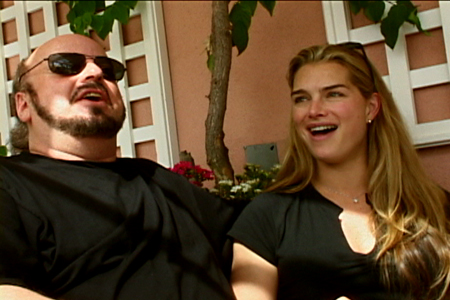|
Reviews of Recent Independent, Foreign, & Documentary Films in Theaters and DVD/Home Video
Directed, Produced & Camera: Nicholas Jarecki. Edited by: Anna Fogg, J.C. Khoury & Nicholas Jarecki. Released by: Green Room Films/imMEDIAte. Country of Origin: USA. 83 min. Not Rated. With: Robert Downey, Jr., Brooke Shields, Mike Tyson, Harvey Keitel, Norman Mailer, Barry Levinson, Jim Browne, Robert Towne, Brett Ratner, Roger Ebert, Bijou Phillips & Woody Allen.
John Calley, former chairman of Sony Pictures, provides a key insight into the director, opining that “the role of the outsider is one that
Jim plays with great comfort.” Indeed, Toback’s iconoclastic image is gradually shown to be as much of an elaborate put-on as it is genuine.
Judging from the list of notables offering testimonials in this film, he’s one of the most well-connected people in Hollywood, though opting to
remain on the margins. Fittingly, contradiction is Toback’s raison d'etre, whether it be the disparity between his privileged background and
renegade status, or his commitment to personal filmmaking, despite being subsequently frustrated in his search for a distributor (in this case,
for When Will I Be Loved, the movie Toback was shooting as Jarecki began this project). During the making of Loved, there’s a classic
moment when
Tobeck painstakingly plans out a sex scene and is able to explicitly recite its choreography again later, gesture by gesture.
The documentary insightfully conveys Toback’s central themes: the juxtaposition of high (classical music) and low (hip hop) culture, and the
intrinsic impulses of gambling, drugs, and sex. Jarecki’s achievement is not letting the remarkably eclectic interview participants take over the
film with their unabashed admiration for the director. (A scene in which Robert Downey, Jr.’s eyes well up when
discussing his own suicide attempt, as he compares his personal demons to those of Toback’s, is overwhelming in its emotional nakedness).
Though bound to be more appreciated by Toback’s fans, Jarecki succeeds admirably in making evident a glaring paradox: despite the chaotic randomness
evoked by the improvisatory quality and the sense of existential fate permeating his movies, Toback’s method is meticulous. Reymond Levy
|

